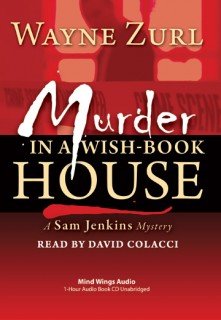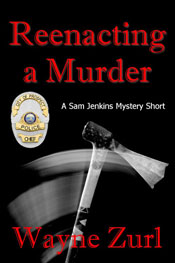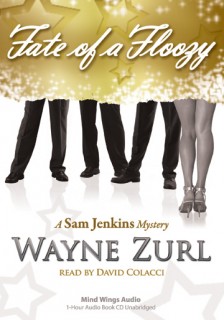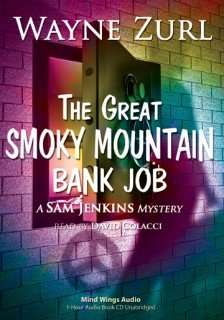Murder In A Wish-Book House

 Chief Sam Jenkins investigates the murder of a Blount County, Tennessee school teacher. All the facts point to a simple conclusion, the man’s wife, an escaped mental patient, killed her husband to gain custody of their small daughter. With the help of his usual cadre of friends and co-workers, Sam devises a plan to lure the obsessed woman into a trap when she tries to kidnap the child from the foster parents caring for the girl. The surprise outcome even disturbs Jenkins.
Chief Sam Jenkins investigates the murder of a Blount County, Tennessee school teacher. All the facts point to a simple conclusion, the man’s wife, an escaped mental patient, killed her husband to gain custody of their small daughter. With the help of his usual cadre of friends and co-workers, Sam devises a plan to lure the obsessed woman into a trap when she tries to kidnap the child from the foster parents caring for the girl. The surprise outcome even disturbs Jenkins.
Based on one of the bloodiest killings in Long Island history. And a couple of plot twists suggested by Stephen King.
Produced as an audio book and simultaineoulsy published as an eBook. See www.mindwingsaudio.com home page for a list of all the sellers.
Purchase books and eBooks from:
Read An Excerpt
I turned left into the driveway and parked my unmarked Ford near the morgue wagon, crime scene van, and a Prospect PD cruiser.
“Hey, boss,” PO Bobby Crockett said. “Sorry ta bother you, but you’ll wanna see this. Or maybe you won’t.”
“That why you’re out here?” He nodded. “What happened?”
“The vic’s name’s Richard McBath, a teacher at Heritage High. His daughter did a sleepover at a friend’s house. This mornin’ ‘bout ten, the girlfriend’s mother brings the kid home and finds Richard stabbed to death.”
“Where’s that woman now?”
“Junior escorted her home. The McBath girl’s with her.”
“Hear anything about Richard having a wife?”
“Not a word.”
“The ME and crime scene guys been here long?”
“Half an hour.”
“A bad one, huh?”
“Ain’t never seen nothin’ like it. Lord have mercy. The blood, the smell, it’s a mess.”
“I’ll hold my nose and take a look.”
I’d seen houses like that before, not only in Tennessee, but back on Long Island where I’d worked as a cop for twenty years. It was one of the kit-homes people picked from a Sears-Roebuck catalog in the 1920s.
Entering the side door, I found myself in a large eat-in kitchen. In the living room, I found Jackie Shuman, a crime scene investigator, and his partner dusting for latents and taking blood samples.
“Jesus H. Christ,” I said. “How many people got killed here?”
Jackie was kneeling near to me, dusting a lamp table.
“All this blood—looks like a bunch o’ people, but it’s jest one. You doin’ aw rot today?”
“I was before I got here. Who’s the ME?”
“Doc Rappaport’s upstairs. Earl’s with him.”
I pulled on a pair of latex gloves and started up the stairs. On the third step I stopped. “Jackie, you photograph the staircase yet? I don’t want to tromp on this blood before you do your thing.”
“Did it first off. Y’all think yer dealin’ with an amateur?”
“Perish the thought.”
I continued up the stairs and found lots of blood splattered on the runner. Red smears and hand prints showed on the wall along the staircase.
The previous day had been cool, but not cold. Luckily, the heat hadn’t been turned up. But the unmistakable smell of a violent crime hung in the air. A warmer house would have created a really nasty-smelling environment.
I guessed our victim had been butchered sometime during the previous afternoon or evening.
The further up I went, the more blood I saw. The smeared hand prints on the walls were augmented with more intense splattering. On the upstairs landing, it looked like the victim slammed into the wall, leaving a red smear.
To my left was a bathroom, to the right, the largest of three bedrooms. The medical examiner, his helper, and our victim were all in that big room.
“Hey, Morris, what’s a nice Jewish boy like you doing in a place like this?”
The doctor said, “This is a bad one, Sam. Such a mess. I haven’t seen many like this.”
I looked around the room. The victim, a medium-sized man, lay on the floor next to a queen-sized bed. From the blood stains on the coverlet, I knew he started off on the bed, got stabbed, and then slid off onto the floor. A night table stood next to the bed, its top drawer open.
“I’m not pushing you, Mo, but can you give me something?”
“Sure, he’s dead.”
“And you know this after how many years of experience?”
He ignored my humor.
“I haven’t counted yet, but I’m guessing thirty to forty stab wounds and who knows how many cuts.”
“Find the weapon?” I asked.
“Yeah, in the shower, a butcher knife. Jackie says it fits the wooden block in the kitchen.”
“Why’s the drawer open?”
“Who knows?”
“If you want help getting him downstairs, give a shout. I’ll muster the troops.”
“Thanks. And my lower back thanks you, too.”
I began my search with the bureau drawers. In the top drawer, among T-shirts and boxer shorts, I found a box of Remington .38 Special cartridges. Twelve of the original fifty rounds were missing.
“You guys come across a handgun?” I asked.
Neither Morris nor Earl had seen one. I checked the night table with the open drawer and found only the personal trinkets that end up in everyone’s night table. No gun.
I tossed the closet; under the mattress; under the rug; the bottoms, backs, and sides of all the drawers; and everywhere else in the bedroom someone could look for clues—nothing.
I tried the second bedroom and found the closet full of women’s clothing, neatly arranged. Four empty hangers hung on the pole. When I opened the bi-fold doors, the heady smell of lavender attacked my senses. All the drawers in that room contained more women’s clothes. I thought it strange, a young couple with separate bedrooms, and so far no mention of a wife.
I looked at a nine-inch chef’s knife that lay on the shower floor. A shower still wet from use. I opened the glass door and smelled lavender—not as strong as the sachet in the closet, but unmistakably the same, perhaps from a soap or shampoo.
I made my way into the third bedroom, the little girl’s. I found nothing related to the crime.
Downstairs, in a storage room adjacent to the kitchen, I found lots of cardboard boxes with items unnecessary to everyday life in the McBath household. But I noticed an interesting thing: two suitcases—one large, one medium—and a void, a space that made me think a third suitcase had been removed, a smaller one.
I went through the kitchen door, and out to the side yard.
“Bobby,” I said, “did you run the plate on that truck in the driveway?”
“Yessir, comes back to the victim.”
“You check the garage?”
“Yeah, nothin’ ‘cept all the garagey stuff you’d expect.”
“You get any more info on our guy or his family?”
“Not yet.”
“I’m going to call Bettye and get her to fire up the computer. How do I find the woman who called this in?”
He gave me the information.







 What starts out as a slam-dunk arrest of two subjects for a series of armed robberies on the greenway at Prospect, Tennessee turns into a murder investigation at a local nursing home.
What starts out as a slam-dunk arrest of two subjects for a series of armed robberies on the greenway at Prospect, Tennessee turns into a murder investigation at a local nursing home.
 One potential witness said, “Whitey wasn’t the best-liked member of the reenacting community, but who would have thought he’d end up like this?”
One potential witness said, “Whitey wasn’t the best-liked member of the reenacting community, but who would have thought he’d end up like this?”
 Sam Jenkins investigates the shotgun murders of an aging movie star and the younger man with whom she was having an affair.
Sam Jenkins investigates the shotgun murders of an aging movie star and the younger man with whom she was having an affair.
 Sam Jenkins’ law enforcement colleagues know he’s quick to ask a professional favor. But when a beautiful Treasury agent asks for his assistance, he balks.
Sam Jenkins’ law enforcement colleagues know he’s quick to ask a professional favor. But when a beautiful Treasury agent asks for his assistance, he balks. 
 Hurricane Irene caused thousands of coastal residents to flee inland and escape the storm’s carnage.
Hurricane Irene caused thousands of coastal residents to flee inland and escape the storm’s carnage.



